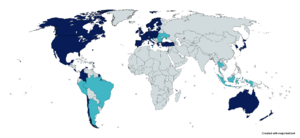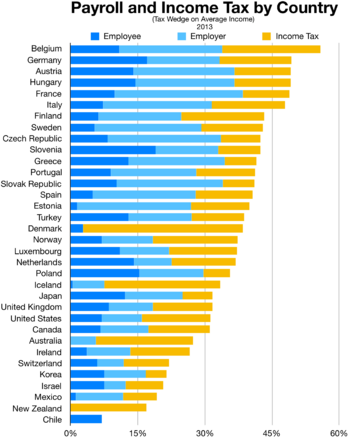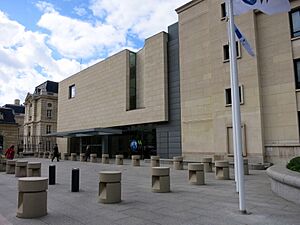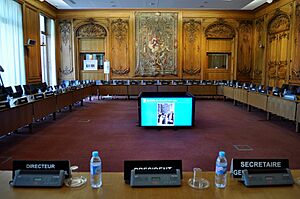OECD facts for kids
|
Organisation de coopération et de développement économiques
|
|
 |
|

Member states Applicants
|
|
| Abbreviation |
|
|---|---|
| Established | 16 April 1948 (as OEEC) 30 September 1961 (as OECD) |
| Type | Intergovernmental organisation |
| Headquarters | Château de la Muette Paris, France |
|
Membership
|
38 countries
|
|
Official languages
|
|
| Mathias Cormann | |
|
Deputy Secretaries-General
|
|
|
Budget
|
€338.3 million (2023) |
The Organisation for Economic Co-operation and Development (OECD) is a group of 38 countries that work together. It was started in 1961. The main goal of the OECD is to help countries grow their economies. It also aims to boost trade around the world.
The OECD is a place where member countries can share ideas. They look for solutions to common problems. They also find good ways to do things and work together on policies. Most OECD members are wealthy countries. They are considered developed nations.
As of 2024, about 1.38 billion people live in OECD countries. People in these countries live to about 80 years old on average. In 2017, OECD countries made up a large part of the world's economy. The OECD's main office is in Paris, France. It is funded by its member countries. The OECD publishes a lot of information about economies.
Contents
History of the OECD
From OEEC to OECD
The OECD started as an older group called the Organisation for European Economic Co-operation (OEEC). This group was formed in April 1948. Its main job was to help European countries rebuild after World War II. They used aid from the Marshall Plan to do this. The OEEC was based in Paris, France.
After the Marshall Plan ended in 1952, the OEEC focused on economic issues. Some countries felt the OEEC needed a bigger role. They wanted it to help less developed countries too. So, in 1960, they decided to create a new organization. This new group would include the United States and Canada. They also wanted Japan to join.
Founding the OECD
The agreement to create the OECD was signed on December 14, 1960. The OECD officially took over from the OEEC in September 1961. The first members were the European countries from the OEEC, plus the United States and Canada.
Here are the founding members:
- Austria
- Belgium
- Canada
- Denmark
- France
- West Germany
- Greece
- Iceland
- Ireland
- Italy
- Luxembourg
- Netherlands
- Norway
- Portugal
- Spain
- Sweden
- Switzerland
- Turkey
- United Kingdom
- United States
Over the next 12 years, Japan, Finland, Australia, and New Zealand joined. The OECD also created other groups. These include the OECD Development Centre and the International Energy Agency (IEA).
The main goals of the OECD are:
- To help member countries achieve strong economic growth.
- To increase jobs and improve living standards.
- To help both member and non-member countries grow their economies.
- To help world trade grow.
The OECD uses the spelling "Organisation" with an "s". It also uses a hyphen in "Co-operation".
Expanding to Eastern Europe
After the changes in Eastern Europe in 1989, the OECD started helping countries there. It helped them move towards market economies. Countries like Poland, Hungary, the Czech Republic, and Slovakia joined the OECD between 1996 and 2000. South Korea and Mexico also became members during this time.
Recent Growth and Changes
In the 1990s, more European countries wanted to join. In 2007, the OECD invited Chile, Estonia, Israel, Russia, and Slovenia to discuss joining. Chile, Slovenia, Israel, and Estonia became members in 2010. However, in 2014, the OECD stopped talks with Russia. This was because of Russia's actions in Crimea.
In 2013, Colombia and Latvia were invited to join. Latvia became a member in 2016, and Lithuania joined in 2018. Colombia became a member in 2020, and Costa Rica joined in 2021.
Other countries like Argentina, Brazil, Croatia, Malaysia, and Peru have also shown interest. In 2022, the OECD began membership talks with Argentina, Brazil, Bulgaria, Croatia, Peru, and Romania. In March 2022, Russia and Belarus were suspended from the OECD. This was due to the conflict in Ukraine.
What the OECD Does
Helping with Taxes
The OECD helps set rules for how large international companies are taxed. These rules aim to make sure companies pay their fair share. They also try to stop companies from avoiding taxes.

The OECD has a model tax agreement. This helps countries decide which country has the right to tax certain income. It also has guidelines for how companies should set prices for goods and services traded between their own branches in different countries. This is called "transfer pricing."
- Pillar 1
- Taxing Big Companies
- This is a plan to tax large international companies where they do business. This includes places where they sell products even if they don't have a physical office there. This plan aims to make sure companies pay taxes in the countries where they make their profits.
- Pillar 2
- Global Minimum Tax
- In 2021, 130 countries agreed on a new plan. It sets a global minimum corporate tax rate of 15%. This means if a country taxes a big company at a lower rate, the company's home country can collect the difference. This new rule aims to stop companies from moving their headquarters to countries with very low taxes. Governments hope to get back billions of dollars in lost tax money each year.
Guidelines for Companies
The OECD also has guidelines for how international companies should act responsibly. These are not strict laws, but they are recommendations. They cover things like human rights, labor, environment, and fighting corruption.
How the OECD Works
The OECD has three main parts:
- Member Countries: Each country has a team led by an ambassador. They form the OECD Council. The Council guides the work of the organization.
- Committees: These are groups of experts from member countries. They focus on specific areas like economics, trade, or education. They discuss policies and share findings with their governments.
- Secretariat: This is the main office, led by the Secretary-General. It has about 2,500 staff members. They collect data, study trends, and predict economic changes. They also research social changes, trade, environment, and technology.
Meetings and Discussions
Representatives from member countries attend many meetings. These meetings help officials and experts connect and share ideas. The OECD also holds special meetings for ministers from different countries.
Important meetings include:
- The yearly Ministerial Council Meeting: Ministers of Economy from all member countries attend.
- The annual OECD Forum: This brings together leaders from business, government, and other groups. It is open to the public and happens at the same time as the Ministerial Meeting.
- Thematic Ministerial Meetings: Ministers who work in the same area (like environment or labor) meet to discuss specific topics.
The Secretariat
The OECD Secretariat helps governments by providing information and analysis. It collects data, watches trends, and predicts economic changes. It also researches social changes, trade, education, and other areas.
The Secretariat is divided into different departments, called Directorates. Each Directorate focuses on a specific area, like economics, education, or trade.
Secretary-General
The Secretary-General leads the OECD Secretariat and chairs the OECD Council. The Secretary-General is chosen by all member countries agreeing on one person.
| No. | Secretary-General | Time served | Country of origin | Notes |
|---|---|---|---|---|
| 1 | Thorkil Kristensen | 30 September 1961 – 30 September 1969 | ||
| 2 | Emiel van Lennep | 1 October 1969 – 30 September 1984 | ||
| 3 | Jean-Claude Paye | 1 October 1984 – 30 September 1994 | ||
| — | Staffan Sohlman (interim) | 1 October 1994 – November 1994 | ||
| 3 | Jean-Claude Paye | November 1994 – 31 May 1996 | ||
| 4 | Donald Johnston | 1 June 1996 – 31 May 2006 | ||
| 5 | José Ángel Gurría | 1 June 2006 – 31 May 2021 | ||
| 6 | Mathias Cormann | 1 June 2021 – present |
Committees and Groups
There are about 200 committees and working groups. They focus on specific policy areas. These include economics, trade, science, and education. Members from different countries meet in these groups. They discuss policies and check on progress.
Special Bodies
The OECD also has several special groups. These include:
- Development Assistance Committee: Helps with aid to developing countries.
- International Energy Agency: Focuses on energy security and policy.
- Nuclear Energy Agency: Deals with nuclear energy safety and development.
- International Transport Forum: Works on transport policies.
Voting and Decisions
Decisions at the OECD are made by all members agreeing. Each member country has one vote. If a country doesn't agree but doesn't want to stop a decision, it can choose not to vote.
OECD Member Countries
Current Members
As of May 2021, there are 38 members of the OECD. Many of these countries are in Europe. There are also members from North America, South America, Asia, and Oceania.
| Country | Membership Date | Geographic location |
|---|---|---|
| 7 June 1971 | Oceania | |
| 29 September 1961 | Europe | |
| 13 September 1961 | Europe | |
| 10 April 1961 | North America | |
| 7 May 2010 | South America | |
| 28 April 2020 | South America | |
| 25 May 2021 | Central America | |
| 21 December 1995 | Europe | |
| 30 May 1961 | Europe | |
| 9 December 2010 | Europe | |
| 28 January 1969 | Europe | |
| 7 August 1961 | Europe | |
| 27 September 1961 | Europe | |
| 27 September 1961 | Europe | |
| 7 May 1996 | Europe | |
| 5 June 1961 | Europe | |
| 17 August 1961 | Europe | |
| 7 September 2010 | Middle East | |
| 29 March 1962 | Europe | |
| 28 April 1964 | Asia | |
| 1 July 2016 | Europe | |
| 5 July 2018 | Europe | |
| 7 December 1961 | Europe | |
| 18 May 1994 | North America | |
| 13 November 1961 | Europe | |
| 29 May 1973 | Oceania | |
| 4 July 1961 | Europe | |
| 22 November 1996 | Europe | |
| 4 August 1961 | Europe | |
| 14 December 2000 | Europe | |
| 21 July 2010 | Europe | |
| 12 December 1996 | Asia | |
| 3 August 1961 | Europe | |
| 28 September 1961 | Europe | |
| 28 September 1961 | Europe | |
| 2 August 1961 | Middle East | |
| 2 May 1961 | Europe | |
| 12 April 1961 | North America |
Countries Working Towards Membership
Several countries are currently in talks to join the OECD. These include:
Other countries that have applied or shown interest are Malta, Thailand, Ukraine, and Kazakhstan.
Former Members
The Free Territory of Trieste was a member of the OEEC until 1954. It then became part of Italy.
Accession Talks Terminated
The OECD had talks with Russia about joining. However, these talks were stopped in 2014. This was due to Russia's actions in Crimea. In 2022, the process for Russia to join was officially ended. Belarus was also suspended from the OECD in 2022.
OECD Budget and Funding
The OECD's budget for 2023 was about €338.3 million. All member countries contribute money to the main budget. The amount each country pays depends on the size of its economy. There are also special programs that only some members fund.
See also
 In Spanish: Organización para la Cooperación y el Desarrollo Económicos para niños
In Spanish: Organización para la Cooperación y el Desarrollo Económicos para niños
- Marshall Plan
- International Transport Forum
- OECD Better Life Index




